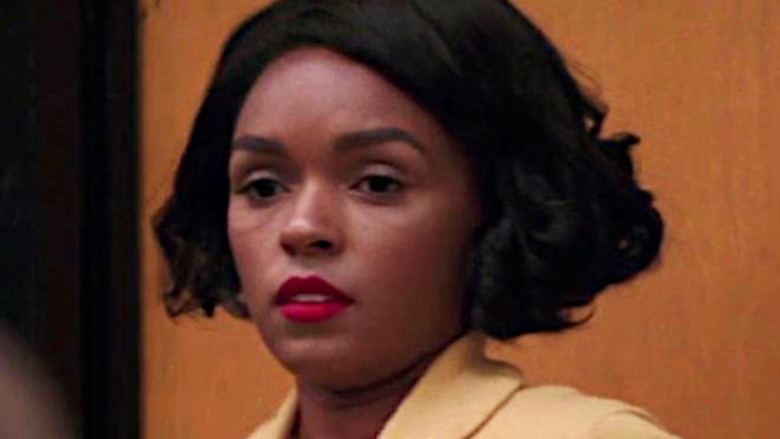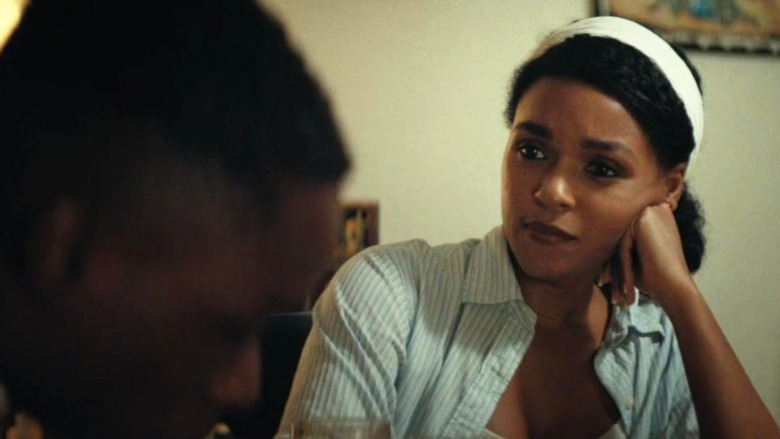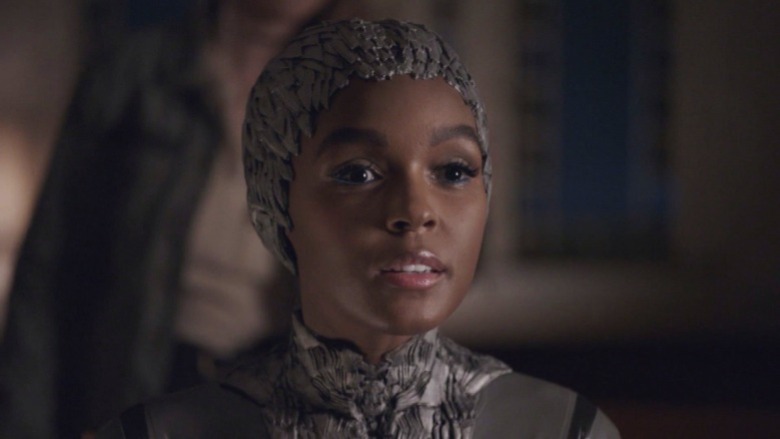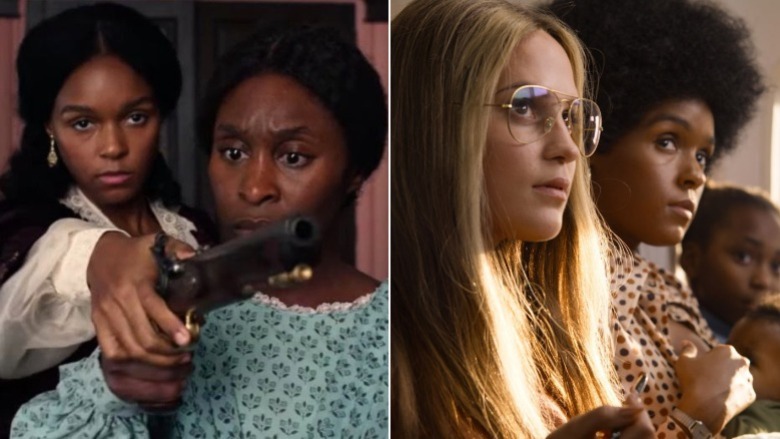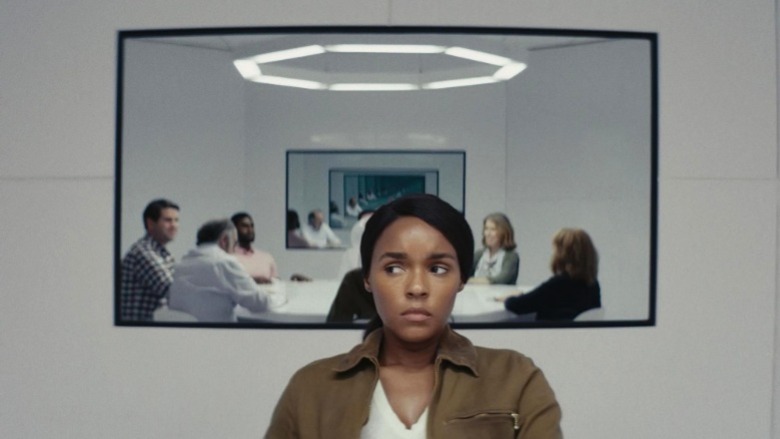Why Mary Jackson From Hidden Figures Looks So Familiar
"Hidden Figures" was one of the biggest hit dramas of the past few years. The film's telling of the true story of NASA mathematicians Katherine Johnson, Dorothy Vaughan, and Mary Jackson, and their contributions to the 1960s' Project Mercury, was at once culturally urgent and crowd-pleasing enough to earn $170 million at the North American box office against a $25 million budget (via BoxOfficeMojo), a rare A+ Cinemascore, and three Academy Award nominations (via IMDb), including one for Best Picture.
At the center of the movie's popularity was the perfection of its ensemble cast, which gave three great Black actresses a long-overdue window of blockbuster-grade notoriety. Two of those actresses were already established pros: Taraji P. Henson, then at the height of her reign on Fox's "Empire," and Octavia Spencer, whose Best Supporting Actress Oscar nomination for "Hidden Figures" would be the second of three so far in her career. The third actress rounding out "Hidden Figures'" main trio, though, was a newcomer to movies, in one of a diptych of breakout roles she had in 2016.
We say "movies," of course, because the actress in question was already a staple of the entertainment world by then — but in a different line of work. Singer, songwriter, rapper, producer, and all-around visionary Janelle Monáe came into "Hidden Figures" as one of the leading voices of contemporary pop music, and came out of it as the cinematic up-and-comer everyone's eyes were on. Here's where else you may have seen her acting work.
Janelle Monáe quietly stole the show in Moonlight
The entire 2010s decade was a big victory lap for Janelle Monáe, singer, as she released one critically acclaimed album after another, delivered countless memorable performances, and climbed steadily to the top of the pop music pyramid. But 2016, in particular, was just an unbelievable year for Janelle Monáe, actress. As if stealing the show between two Oscar-caliber veteran actresses in "Hidden Figures" wasn't enough, she also gave a performance in "Moonlight" that made it hard to believe she was a first-timer.
The already-classic Best Picture-winning romantic drama divided most of its time between the three actors who played protagonist Chiron and the three who played his lifelong crush Kevin, with recurring check-ins on Chiron's mother Paula (Naomie Harris), and ample attention in the first act devoted to his childhood mentor Juan (Mahershala Ali). Monáe, meanwhile, had a comparatively small role as Juan's girlfriend Teresa, who acts as a second mother to Chiron as he's growing up. She only appears in a handful of scenes, and doesn't get show-stopping moments like Ali and Harris do. That might explain why she was the only one of the three to miss out on an Oscar nomination.
But even so, Teresa is one of "Moonlight'"s best characters, and that's entirely due to the natural energy Monáe brings to her. Amidst all the emotional chaos of Chiron's life, Teresa's soothing, dependable care for him gets to be one of the film's most moving little touches. As she tells him in one scene, "You know my rule. It's all love and all pride in this house." The unshowy ease with which Monáe projected such solidarity immediately marked her down as an acting force to be reckoned with.
She returned to her sci-fi roots on Philip K. Dick's Electric Dreams
Janelle Monáe's discography has been marked by a keen interest in the tropes and traditions of science fiction. Throughout her first EP, "Metropolis: The Chase Suite," and her first two studio albums, "The ArchAndroid" and "The Electric Lady," she constructed an elaborate overarching narrative inspired by Fritz Lang's silent classic "Metropolis," following an android named Cindi Mayweather as she endeavored to save the world from tyranny (via B&S). Even when she put that project on hold for 2018's "Dirty Computer," her neo-soul remained rooted in futuristic, dystopian concepts.
So it was only a matter of time until she gravitated toward that same genre in her budding acting career. And that finally happened in 2017, when she starred on an episode of Channel 4's anthology series "Philip K. Dick's Electric Dreams," which aired via Amazon Prime Video in the U.S.
An adaptation of the classic sci-fi author's eponymous 1955 short story, "Autofac" follows a group of survivors of a nuclear fallout as they attempt to game the system of the automated factory that's ravaging their natural resources to fabricate and deliver useless goods. Sidestepping the heroism she displayed in her "Cindi Mayweather" musical persona, Monáe plays Alice, a service unit android sent by the factory after Emily (Juno Temple) and her cohorts successfully lob a fake customer complaint.
It's an almost comedic performance, which sees Monáe take advantage of her training as a dancer and vocalist to parody the repetitive, lifeless protocols of customer service bots. Then, the episode veers in unexpected directions, and Monáe is allowed to display her stunning subtlety and precision as an actress once again.
Janelle Monáe played mentors to two historical figures
Monáe's scene-stealing performance in "Moonlight" suggested a knack for playing warm, generous, self-reliant leaders and mentors. She exercised that particular aptitude again in two subsequent female-directed historical drama films: Kasi Lemmons' "Harriet" and Julie Taymor's "The Glorias."
In "Harriet," which tells the story of abolitionist and freedom fighter Harriet Tubman (Cynthia Erivo), Monáe plays Marie Buchanon, a fictionalized composite of the Philadelphia connections who helped Tubman during her one-year stay in the city (via Bustle). Buchanon is presented as the free-born daughter of a freed slave, who used her freedom to open her own boarding house. She acts as the "guide" in Tubman's passage to the life of a free woman — taking her in, advising her, helping her find a job, and providing her with a gun and fake documents for her expeditions. Once again, Monáe effortlessly comes across as the best friend-slash-mentor anyone could want.
She fulfills a similar role in a vastly different context in "The Glorias," a historical biopic set a whole century later than "Harriet." This time, Monáe's character is a real person, who is, in fact, alive to this day. She plays Dorothy Pitman Hughes, an activist and public speaker who has advocated for racial justice, gender equality, and child welfare throughout her life. "The Glorias" captures the beginnings of her friendship with feminist journalist Gloria Steinem (Lily James, then Julianne Moore); Hughes is depicted as teaching Steinem the ways of political activism. It's yet another role in which Monáe shines bright despite not being at the center of the movie.
Monáe took over from Julia Roberts as the protagonist of Homecoming
Amazon Prime Video's "Homecoming" was one of the breakout series of 2018, throwing a curveball per minute at viewers as it unraveled the dense conspiracy surrounding the Homecoming Transitional Support Center for veterans and its shadowy parent company, Geist. Part of what made the 10-episode first season work so well was the sheer prowess of protagonist Julia Roberts, who got to sink her teeth into one of the meatiest dramatic roles of her career in years. Every minute of her performance as social worker Heidi Bergman, and of her interactions with troubled veteran Walter Cruz (Stephan James), was riveting.
Therefore, it was quite possibly the most daunting challenge of Janelle Monáe's acting career yet when she got tapped to take over as the show's protagonist in Season 2, following Roberts' departure. Playing Jackie Calico, a woman who suddenly wakes up on a rowboat in a catatonic state and soon finds herself embroiled in the Homecoming conspiracy, Monáe anchored the entire season. Jackie's desperate search for her own identity demanded as much of her as an actress as Heidi's trip down memory lane did of Roberts in Season 1, if not more, and the series ultimately allowed Monáe to prove her mettle as a leading lady beyond any doubt. As Jen Chaney of Vulture wrote, "Monáe, who usually plays supporting roles, handles the lead with total confidence."
